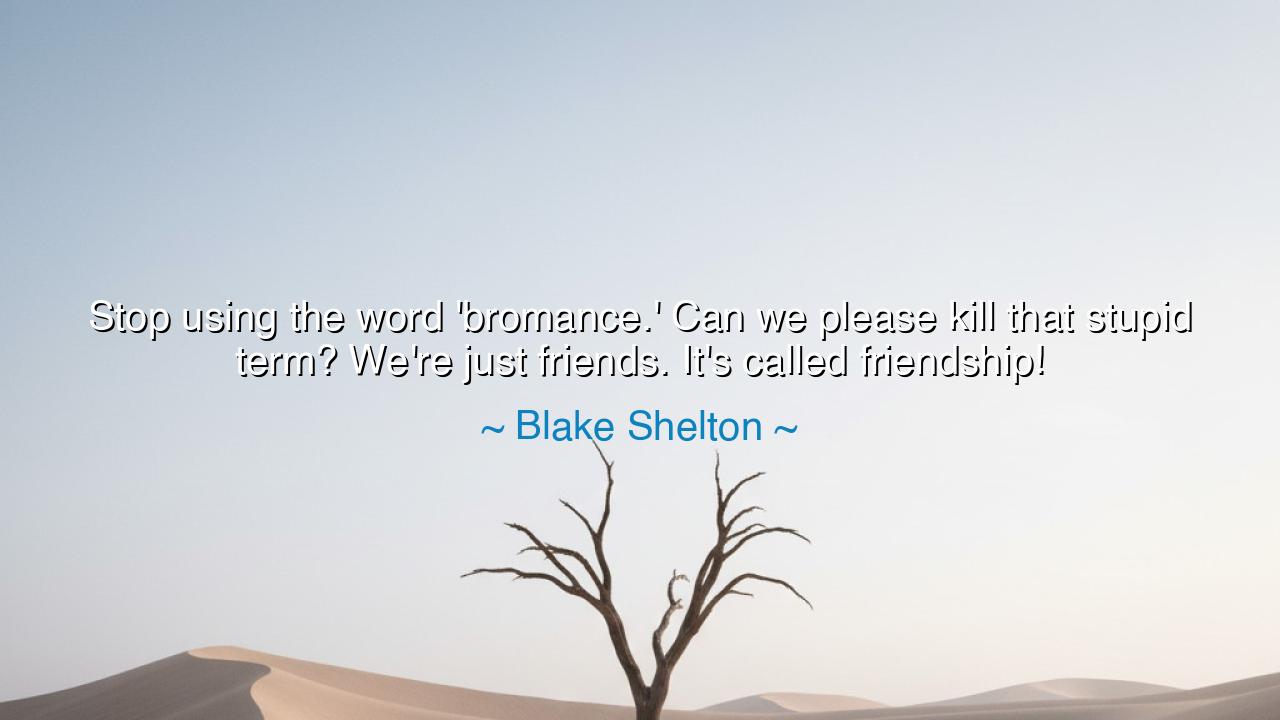
Stop using the word 'bromance.' Can we please kill that stupid
Stop using the word 'bromance.' Can we please kill that stupid term? We're just friends. It's called friendship!






“Stop using the word ‘bromance.’ Can we please kill that stupid term? We’re just friends. It’s called friendship!” — with these sharp and honest words, Blake Shelton calls us back to the ancient dignity of friendship, a bond that needs no new name, no disguise, no modern ornament to make it meaningful. Beneath his humor and bluntness lies a profound truth: that in our age, the purity of friendship — especially between men — has been clouded by irony, discomfort, and mislabeling. He speaks not merely as a man defending camaraderie, but as one restoring the honor of a word once held sacred: friendship — that noble alliance of souls, founded not in gain or desire, but in mutual respect, loyalty, and love unburdened by shame.
In the old days, the ancients wrote of friendship with reverence, as one of life’s highest virtues. Aristotle called it the crown of human relationships, a bond more enduring than passion or power. David and Jonathan, in the scriptures, swore friendship “as one soul bound to another,” a covenant sealed not by blood, but by spirit. Blake Shelton, in his plainspoken way, echoes the same wisdom — that true friendship requires no apology, no awkward label to explain its affection. When he says, “We’re just friends,” he is not belittling the bond; he is defending its simplicity. In a world that demands everything be redefined or mocked, he insists that friendship remains holy in its own right.
The term “bromance”, though born of jest, reflects a modern discomfort — the fear of expressing affection between men without laughter as a shield. In ancient times, such closeness was celebrated without embarrassment. Warriors who fought side by side shared tears and vows; philosophers debated for hours in admiration of each other’s minds; kings and poets alike spoke openly of their affection for their companions. Yet in our age, sincerity has been replaced by irony, and intimacy by avoidance. Shelton’s call to “kill that stupid term” is, in truth, a call to restore honesty and courage to friendship, to speak love without laughter and loyalty without labels.
Consider the friendship between C.S. Lewis and J.R.R. Tolkien — two men of faith, intellect, and imagination. Their companionship gave birth to worlds: Narnia and Middle-earth. They disagreed often, yet their respect never faltered. Their friendship was not romantic, nor competitive, but creative — a meeting of minds that elevated both. When Lewis faltered in faith, Tolkien stood firm beside him; when Tolkien despaired of his long, unfinished stories, Lewis urged him onward. What the modern world might jokingly call a “bromance” was, in truth, a sacred friendship, the kind that changes destinies and reshapes the world.
Shelton’s frustration is thus not only humorous but heroic. He reminds us that affection between friends, especially men, is not a weakness to be mocked or sexualized, but a strength to be revered. In a culture that prizes independence and distances itself from tenderness, friendship stands as an act of quiet rebellion — an affirmation that the heart, too, needs companions. To say, “It’s called friendship!” is to declare that the love between friends — unromantic, unselfish, and unwavering — is one of life’s purest forms of connection.
Let this, then, be the teaching passed down to all generations: do not mock friendship by dressing it in irony. Do not fear closeness, nor hide behind humor when affection arises. Be unashamed to say, “I love my friend,” as the ancients once said without hesitation. A world that loses its reverence for friendship will soon lose its reverence for love itself, for it is friendship that teaches us loyalty, trust, patience, and sacrifice. It is friendship that steadies the heart long after passion fades, and that gives courage in the face of solitude.
To live rightly, therefore, is to honor friendship — to call it by its true name, to nurture it with honesty, and to defend it from cynicism. Love your friends deeply, as brothers and sisters in spirit; stand with them not for what they offer, but for who they are. Speak your affection freely, and never let the world make you ashamed of it. For friendship, untainted and unpretending, is the oldest and most sacred bond known to humankind.
Thus, Blake Shelton’s words, though cast in jest, carry the echo of timeless wisdom: let us not trivialize friendship with shallow names. Let us call it what it is — friendship — that brave and beautiful communion of hearts, simple yet profound, ordinary yet divine. For when we speak the truth of it, we honor not only our companions but the best within ourselves — the part that knows, even in silence, that love without pretense is the truest kind of love there is.






AAdministratorAdministrator
Welcome, honored guests. Please leave a comment, we will respond soon